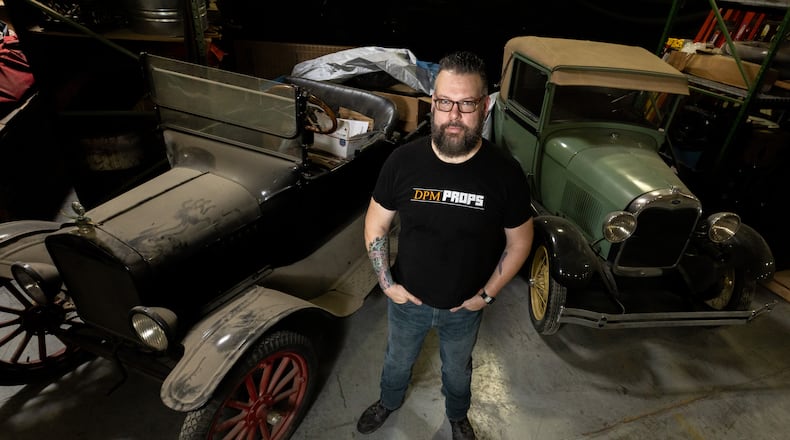About three months ago, Nick Morgan was working as a set decorator for film and television. Now, he’s handing out flyers for Rainy Day Revival, an oddities shop in Little Five Points, or he’s cleaning the taxidermy creatures stored at Obscure Props.
Morgan has worked as a set decorator professionally since 2008, but he’s been making movies since the ‘90s. His most recent job in the film industry was in May, but it shut down a few days after the writers strike began.
Since then, Morgan is picking up any work he can find. Right now, that happens to be at Rainy Day Revival and Obscure Props, but he’s done a commercial here and there and worked on a stop-motion movie for an independent toy company. His wife, who’s stayed at home with the kids for the past ten years, has started making and selling steel fire bowls to bring in a little extra income.
“We’re getting by, you know,” Morgan said. “Everybody’s in this survival mode right now and just hustling every gig they can.”
Credit: Katelyn Myrick
Credit: Katelyn Myrick
Jeremy Gibbs, owner of Obscure Props and Rainy Day Revival, said he put an ad on Facebook looking to hire people in the film industry who have lost their jobs. Gibbs said he received around 40 applications, and he’s doing what he can to find work for them.
Before the general public heard about it, folks in the TV and movie industry could see it slowing down. Fewer productions were being slated, fewer calls were coming in for work and the murmur of a writers strike was spreading. The uncertainty made it difficult to make contingency plans.
The writers strike, which began in early May, and the actors strike, which began in July, have all but halted the film industry in its tracks, and there are few jobs to be found.
In Georgia, the film and television industry brought in around $4.4 billion during the 2022 fiscal year, according to the Georgia Film Office. Georgia has led the nation in jobs gained in the television and film industry with an increase of 15,611 jobs from 2011 to 2021, according to the U.S. Bureau of Labor Statistics. With a near total shutdown, those who are out of work for an indefinite amount of time are looking to pick up odd jobs just to make ends meet.
No end in sight
Chuck Porterfield, a locations professional, said he’s always been able to find work when he needs it. Working in the film industry can be unreliable; it demands 70-80 hour weeks and 12-plus hour days, and when a production ends, it’s time to start looking for the next gig.
In the eight years since Porterfield started working professionally, he could always find that next gig. Until now.
Porterfield said in May he started working at Village Fitness in East Atlanta and has been picking up extra jobs where he can.
“The amount of money you make from that versus what we can get in the film industry is a fraction, and so it’s leaner,” he said. “So I’m personally looking at other part time work to help supplement that income.”
Aaron Kelly, who has worked doing art direction and set design for around 12 years, started a doggy daycare in his backyard. Since he officially started advertising it, he’s received personal messages from people responding to his ads saying they want to support him and others affected by the shutdown.
In more than a decade of working in the industry, he’s never experienced uncertainty quite like this.
“There’s never been this level of anxiety amongst myself and my coworkers and friends in the industry,” Kelly said. “There’s always been an assumption that something will come around, and even if it does in this one, the timeline is a big question mark.”
The problem, Kelly said, is that a lot of people see the big-name actors as the face of the strike. They don’t see the majority of people behind the scenes “who are living just a few paychecks ahead, or paycheck to paycheck even,” he said.
The shutdown is a strain on family members as well.
Carey Yaruss Sanders and her family moved to Decatur about two years ago so her husband, Gabriel Sanders, wouldn’t have to travel as much for work, but he hasn’t been able to find a solid job since February. He’s been a boom operator and card-carrying member of the International Alliance of Theatrical Stage Employees for 17 years.
At first, she said they thought it was a typical lull in business. They dipped into their savings a bit and weren’t too concerned about it until the writers officially went on strike and it became clear this wouldn’t fix itself in a matter of weeks.
Sanders said it couldn’t have come at a worse time. They had just closed on a townhouse, and her husband invested thousands of dollars into sound mixing equipment for his job.
“We’re just watching money trickle away,” she said.
Credit: Courtesy of Carey Yaruss Sanders
Credit: Courtesy of Carey Yaruss Sanders
For the past 25 years, Sanders has been her own boss teaching private voice lessons, but now she’s looking for full-time jobs. Meanwhile, her husband is considering returning to a former career he had in fitness. She said it’s been hard for him because he “wants to be supporting his family.”
They have two children who will be thrilled to have their father at home more, but she’s worried how they’ll adjust to her working full time.
“I’m hoping that this ends up being a blessing in disguise,” she said, “but it has been really rough.”
A domino effect
Jann Marthaler, owner of antique store Unique Treasures in Snellville, estimated that 13% of her yearly profits, or about $10,000 a month, come from the film industry. Since May, she said she’s seen a drop-off.
“It has affected our bottom line tremendously, and I have 150 people that are vendors in my store and you know, each one of them are affected,” she said.
Morgan said he feels for the vendors who aren’t directly connected to the industry but make money from it by proxy, like Unique Treasures from whom he used to buy props, or restaurants that would serve crew members while they filmed.
Thomas Kerns owns two businesses affected by this — a prop house and a special effects company. His prop house employed five crew members, but he had to lay all of them off about three months ago.
Credit: Steve Schaefer
Credit: Steve Schaefer
He said he did what he could to keep them on, even going so far as to not take any pay for himself, but it got to a point where he didn’t have a choice. Right now, he said he only has one game show renting out props. Normally at this time of year, he would have around 20 to 30 shows.
“It’s definitely a grim picture for us right now,” Kerns said. “We’re doing everything we can to try to keep our head above water.”
Kerns is still renting some props out to local theaters and party planners, but it doesn’t cover the bills, he said. To supplement his income, he’s building out a photography studio inside the prop house for photographers to rent.
“We all love what we do in this industry and just want to get back to work,” Kerns said, “but at the same time absolutely stand with the writers strike and the SAG strike.”
Stand with the strikers
The Alliance of Motion Picture and Television Producers and the Writers Guild of America ended talks in early May after they couldn’t agree on a contract resolution by the deadline. According to a statement by the AMPTP, they offered a proposal to the writers which included “generous increases in compensation for writers as well as improvements in streaming residuals.”
The AMPTP said in a news release they were prepared to improve the offer, but wouldn’t because of the “magnitude of other proposals still on the table that the Guild continues to insist upon.”
SAG-AFTRA, the union representing actors, also announced a strike in June. The AMPTP said they offered them a deal including “historic pay and residual increases, substantially higher caps on pension and health contributions,” among other things.
“The Union has regrettably chosen a path that will lead to financial hardship for countless thousands of people who depend on the industry,” producers said in a statement.
The deal producers offered fell short of the actors’ demands. After talks between the union and producers failed to reach a settlement, SAG-AFTRA president Fran Drescher said in a press conference: “I cannot believe it, quite frankly, how far apart we are on so many things. How they plead poverty, that they’re losing money left and right when giving hundreds of millions of dollars to their CEOs.”
Although only actors and writers are on strike, Porterfield said this is part of showing solidarity with his fellow workers. Despite the fear and anxiety from being out of work, he said he will stand up for labor.
This shutdown could push some to leave the industry altogether, like what Gabriel Sanders is considering, and Kerns said he fears for the young people just entering the workforce who might have a difficult time finding a job in a different industry.
No one can say how long the strike will last or how long they’ll be out of work. Porterfield said it’s a matter of who blinks first, the studios or the laborers.
“These aren’t people trying to take advantage of giant conglomerates,” Porterfield said. “These are regular, hard-working, creative, disciplined people that are just trying to put food on their table.”
About the Author
Keep Reading
The Latest
Featured






